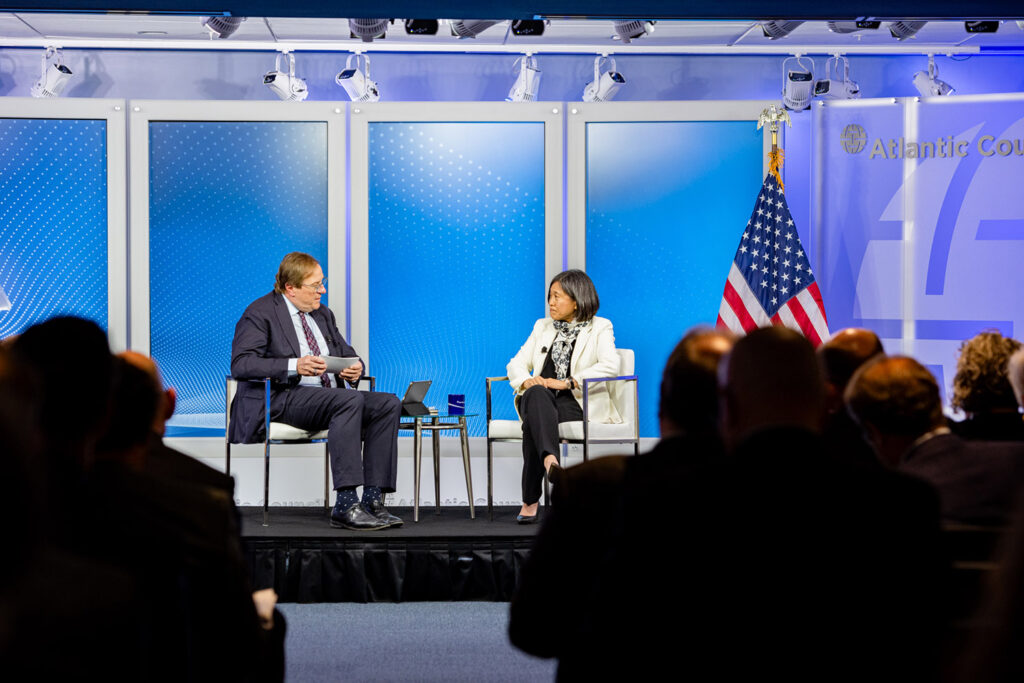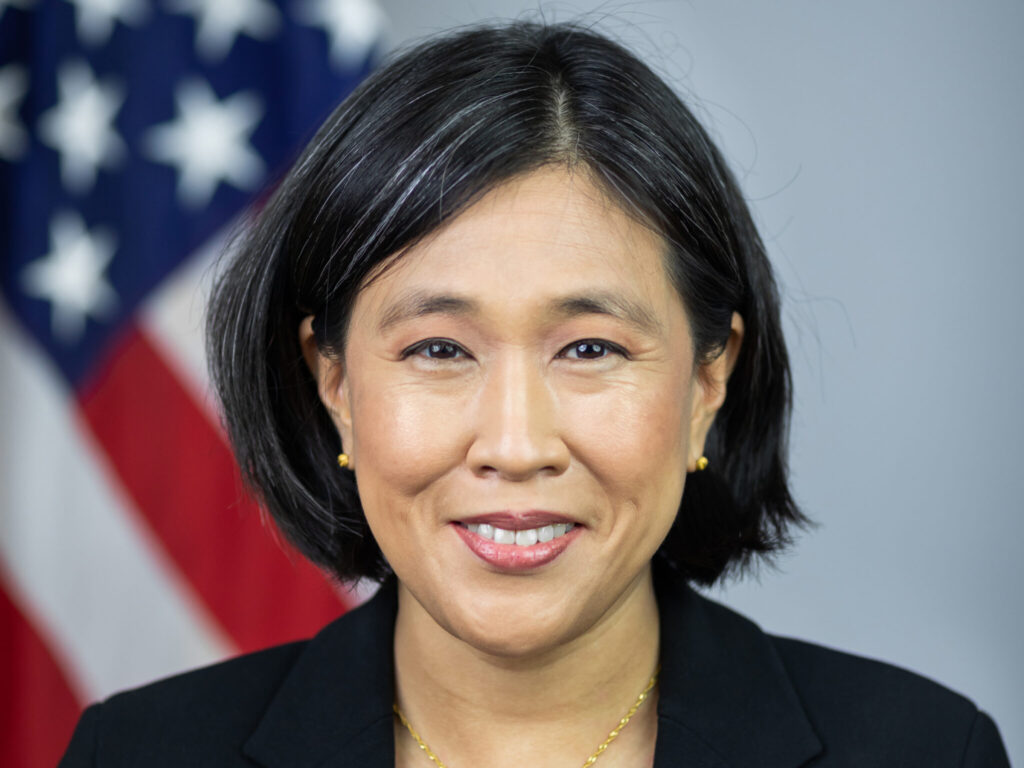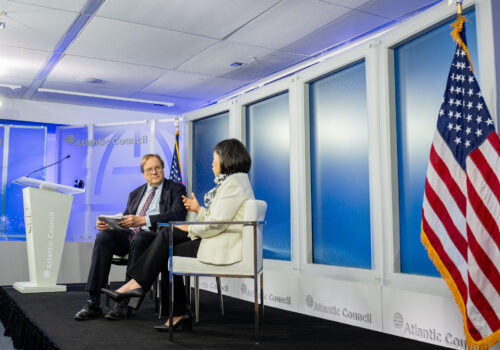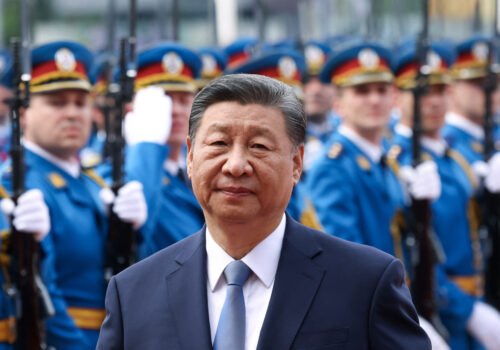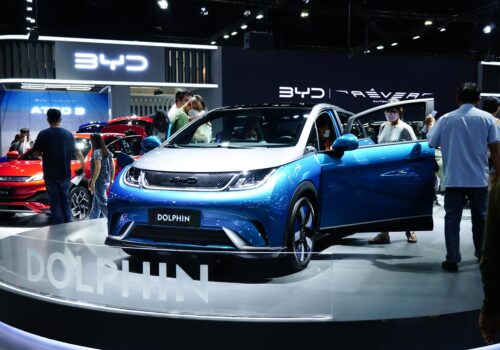Watch the full event
“We need to evolve the way we do trade,” warned US Trade Representative Katherine Tai. “You can’t do that by yourself.”
At an Atlantic Council Front Page event on Monday, Tai discussed how the United States and the European Union (EU) should work together to adapt their trade relationship to a new geopolitical reality.
“Basing that community on a community of democracies is really important,” she said. And while China may have been considered a cooperative partner in the past, Tai noted, “the China that we’re dealing with now, the PRC, is not a democracy; it’s not a capitalist, market-based economy.” And with China having “an incredibly large footprint” across the world, the United States and its partners will need to rethink how to “coexist” with China and “adapt” to today’s global economy, she said.
With the US elections in November pitting the current president against his predecessor, Tai said that a commitment to changing the US approach to trade is something that the Biden and Trump administrations have shared. “The world is significantly different, and . . . the benefits here in the United States are not inclusive enough,” she argued. “I think we share a lot of the same diagnoses.”
Below are more highlights from the conversation, moderated by Atlantic Council President and Chief Executive Officer Frederick Kempe, during which Tai discussed adapting to today’s new geopolitical challenges.
“Hit pause” and “come back”
- Tai said that the quick pace of technological change is putting pressure on traditional approaches to trade. “When we’re talking about data, it’s not just about the bits and bytes that help to facilitate a traditional goods transaction anymore,” she said. “Data is the game itself.”
- She added that this shift on data may require a rethink of traditional approaches to trade. “Isn’t it time for us to hit pause on this, come back . . . and try to get our arms around what is actually happening here and what is in the public interest?” she asked.
- In doing so, the Office of the US Trade Representative (USTR) would need to reconnect with decision makers from “all the other policy silos” across the government, Tai said. “A USTR-led answer to how we should be regulating tech and data . . . is not going to be the right answer.”
- “We have got to figure out what works for the United States . . . what works for our democracy,” she said. “It’s a domestic policy issue first before we bring it to the international realm.”
“Another new world order”
- Today’s globalization “has created a lot of efficiencies.” Tai acknowledged; however, it has also incurred “costs”: for example, fragile supply chains in which a single country can dominate a specific part of the supply chain or a sector. Another cost, she said, is tense geopolitical competition that is “built on pitting our workers against each other . . . creating this kind of a zero-sum competition for economic and industrial growth opportunity.”
- To avoid those costs, Tai said that leaders in the United States and EU will need to adopt a “holistic” approach to trade that incorporates domestic and international needs and economic and security priorities. That holistic approach, she said, will be needed to bring about “another new world order,” she explained.
Eighty years on, are Bretton Woods institutions fit for purpose?
- Tai said that the institutions that formed the foundation for the post-World War II world order—including the Bretton Woods institutions and the United Nations—“are all showing their age.”
- “These institutions still absolutely have an important role to play, if not an even more important role to play today than they did in the past,” Tai said. But the architecture of such organizations, she added, needs “revisitation.”
- “They need to be improved and supported in growing and realizing their full potential,” she explained, “which may require some revamping and some education and investment.”
Katherine Walla is the associate director of editorial at the Atlantic Council.
Watch the full event
Further reading
Mon, Jun 3, 2024
US Trade Representative Katherine Tai on modernizing the transatlantic partnership
Transcript By
Tai outlined how the United States should strengthen transatlantic trade and counter China’s nonmarket economic practices.
Sat, Jun 1, 2024
Xi Jinping visited Europe to divide it. What happens next could determine if he succeeds.
New Atlanticist By Zoltán Fehér
The Chinese leader's mission during his May 5-10 trip to France, Serbia, and Hungary was to sow division in Europe and to rally countries against “de-risking.”
Thu, May 23, 2024
Biden’s electric vehicle tariff strategy needs a united front
Econographics By Sophia Busch, Josh Lipsky
President Biden has announced 100 percent tariffs on Chinese electric vehicles. The challenge is developing a united strategy with G7 allies.
Image: US Trade Representative Katherine Tai speaks with Atlantic Council President and CEO Frederick Kempe at an Atlantic Council Front Page event on June 3, 2024.
